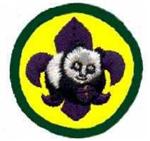The World Conservation Award is worn on the Venturing uniform
shirt,
centered on the right pocket as a TEMPORARY patch.
The World Conservation Award provides an opportunity for individual Cub Scouts, Boy Scouts, Varsity Scouts, and Venturers to "think globally" and "act locally" to preserve and improve our environment. This program is designed to make youth members aware that all nations are closely related through natural resources and that we are interdependent with our world environment.
The Venturing version of the World Conservation Award can be earned by Venturers and Sea Scouts.
- Complete the Ecology elective for the
Ranger award.
- Explain the basic natural systems, cycles, and changes over time and how they are evidenced in a watershed near where you live. Include the four basic elements, land use patterns, and at least six different species in your analysis and how they have changed over time. Discuss both biological and physical components.
- Describe at least four environmental study areas near where you live. Include the reasons for selecting these areas, their boundaries, user groups, past inventories, any outside forces that interact with them, and a list of what things could be studied at each of them.
- Plan a field trip to each of the above areas, including detailed plans for conducting various investigations. Follow all of the requirements such as trip permits, safety plans, transportation plans, equipment needs, etc.
-
- Under the guidance of a natural resources professional, carry out an investigation of an ecological subject approved by your Advisor. Inventory and map the area. Conduct a detailed investigation providing specific data for a specific topic.
- Document and present your findings to your crew, another crew, a Cub or Boy Scout group, or another group.
- Teach others in your crew, another crew, a Cub or Boy Scout group, or another group how to carry out an ecological investigation. Use steps 3 and 4 above with the group so that they may also learn by doing.
- Show the relationships of global events and conditions, both political and environmental, to the areas that you described in steps 1 and 2 above.
- Determine how conditions in your local area also appear in other areas around the world.
- Describe some of the interrelationships between people and our natural resources that affect our global environment.
- Teach others in your crew, another crew, a Cub Scout or Boy Scout group, or another group about the interconnectivity that we all have with each other and our environment.








